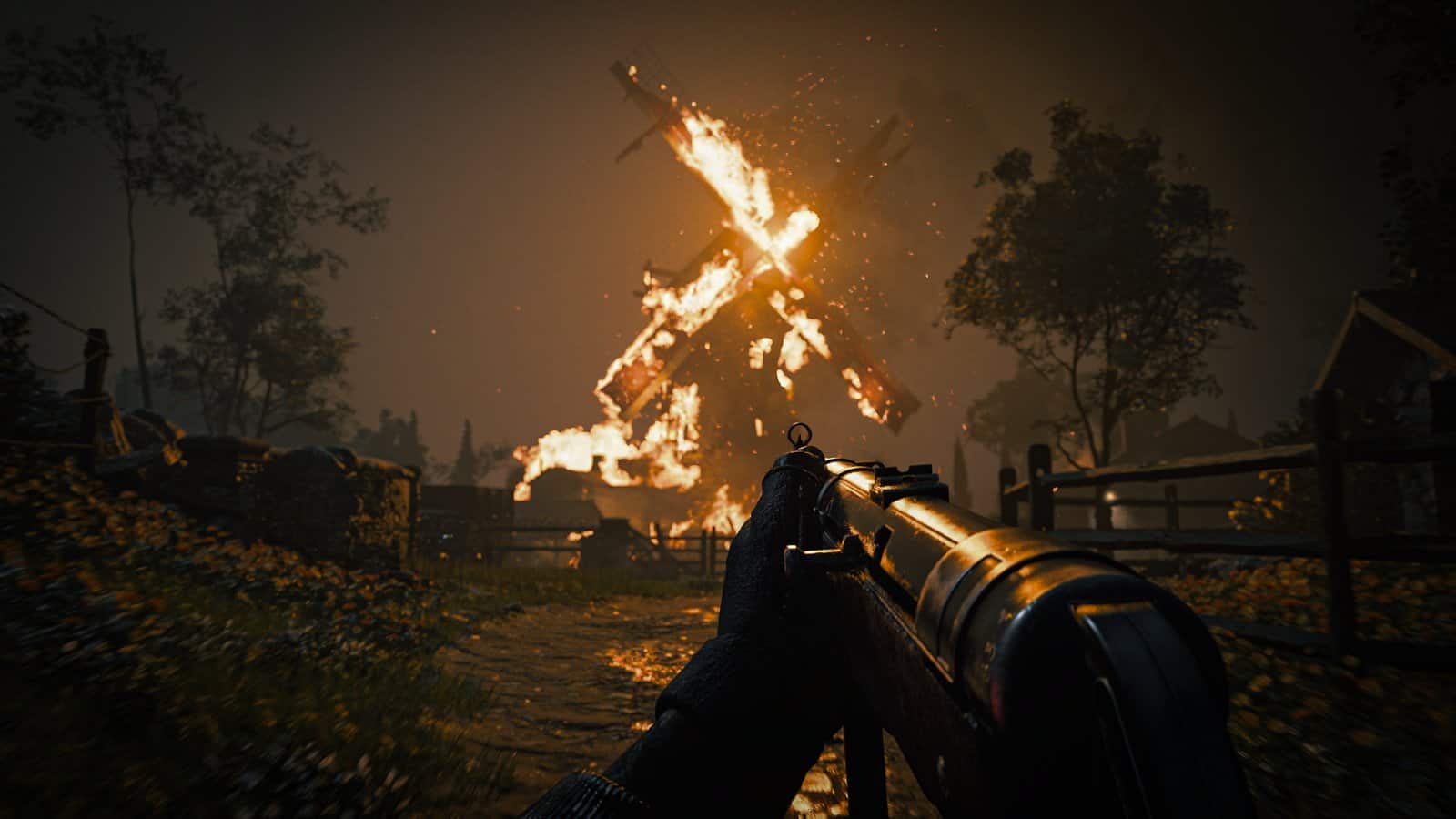Video Gamer is reader-supported. When you buy through links on our site, we may earn an affiliate commission. Prices subject to change. Learn more
The Vanguard of Call of Duty: Vanguard is the name of a secret group of operatives, assembled by the Special Operations Executive in late 1944 or early 1945. The history is hazy, and highly classified. The unit consists of Lucas Riggs, an Australian hothead, who says, “Ever since I was a boy, I knew I wanted to kick down doors and blow things up.” Wade Jackson, a pilot in the United States Navy, who is used to tilting high above the war, in the glass eyrie of his cockpit. Polina Petrova, a Red Army medic, who can be relied upon to bandage the squad’s morale. “Everyone I love is dead,” she says. “And the only time I feel anything is when I watch a German beg for his life.” And the leader, Arthur Kingsley, a British paratrooper. When someone points out the apparent madness of sending so small a force deep behind enemy lines, Kingsley replies, “Sometimes, a little madness is called for.”
Indeed, if you were wondering what possible force could bind these disparate souls, and keep such a crack team from the verge of cracking, madness seems about right. Consider the opening scene, in which our heroes, under cover of night, leap over the carriages of a train. This is standard fare for the likes of Sam Fisher or Arthur Morgan—adventurous types, for whom a railway journey is either a hurtling place to hide or a high-speed A.T.M. But Kingsley and company go about their task under a drumming deluge, with Hamburg glowing like hellfire in the distance, and German troops drawing up alongside them in trucks. Talk about a rail shooter. Also along for the ride are Novak, whom we play as, and Richard Webb—two lesser figures, who branch off into the background as the plot steams ahead.
The plan is to dig up intelligence on something called Project Phoenix, but it is soon derailed when the gang are captured, and interrogated by an SS officer named Jannick Richter. Richter’s problem is that he fails to register even the slightest of quakes in his prisoners. “You do not scare me, little mouse,” says Lieutenant Petrova; given that Richter is played by Dominic Monaghan, this comes as little surprise. As each member of Vanguard is questioned, we flit back into the past and witness the deeds that caught the S.O.E.’s attention and got them picked for Kingsley’s crew. It’s a handy device, which allows us a whistle-stop tour of several grim theatres.
For Petrova, we jump back to 1942 and to Stalingrad, as it is ground down by the Luftwaffe. That same year, we find Jackson doing bombing runs in the Battle of Midway, diving from the clouds and shedding his lethal load along the decks of Japanese aircraft carriers. Meanwhile, we find Riggs in Tobruk, a precarious place to be, in 1941, as the Axis forces lay siege to Libya. Riggs is one of those plainly unlucky sorts, upon whom fate loves to frown, as we encounter him again, later on, fighting in the Battle of El Alamein. There is a fragmentary air to Call of Duty: Vanguard. The flashbacks are great for honing in on each character, but this is supposed to be an ensemble; and, outside of the early moments, and a climactic set piece in Berlin, lavishly furnished with fireballs, we get little sense of Vanguard itself.
The developer is Sledgehammer Games, the studio that gave us Call of Duty: World War II, in 2017. That remains one of the best Call of Duty campaigns in recent memory, beginning with the nauseating lurch of the Normandy landings and coiling tightly around a platoon of American soldiers, as they took part in Operation Cobra. Rooted in a landscape the colour of dead rabbit, it told a simple story—that of fresh American faces turning stale. Call of Duty: Vanguard, by contrast, bounds restlessly between bright and vibrant set pieces, like a hound on the scent of blood, but we lose sight of a subject. It hymns the border-crossing power of teamwork while sending its heroes off into solitary.
Still, it would be churlish not to point out, in such a crazed and fleeting campaign, the treasures on offer. The game runs in the IW 8.0 engine, which is so laughably beautiful that it makes you wonder what it could dream up, were it not bent so inexorably toward conflict. Check out the sunlight in Petrova’s home, in Stalingrad, as it stains the net curtains; or the spidery lace of the tablecloth, as she sits down to spend time with her family. The potential for a tender moment here is undercut somewhat by the objective that appears onscreen, issued like an order: “Spend time with your family”—as though even the quiet quarters of civilian life are to be seized and executed like a mission. Elsewhere, Sledgehammer pays homage, albeit briefly, to Brothers in Arms (whose absence, in the realm of World War II shooters, is dearly felt these days), as Kingsley motions his comrades to supply cover fire on fixed positions.
Keep an eye out, too, for the flashes of surreal and filmic texture that flare up without warning; at one point, a windmill turns, ablaze, against a sky of velvety black. At another, we see an apartment building, from the opposite roof, as German troops prepare to storm it, with Petrova’s grandfather on a high floor, visible through a lit window. It recalls the scene, in The Pianist, where we are given a horrifying cross-section of a similar tenement, in Warsaw, as the SS comes to call.
Perhaps it’s only right that the campaign of Call of Duty: Vanguard feels scattered and driven to the edge of the unreal. It was distressing, in Call of Duty: World War II, to go from a narrative so wearily embedded in the mud of atrocity (including an appearance of the Berga concentration camp) to a mode entitled “Nazi Zombies.” Here, the shift, to the multiplayer suite and to the zombies mode, induces less of a shudder. The latter, oddly enough, is a letdown. It has been made by Treyarch, the developer that first ushered the undead into this series, in Call of Duty: World at War. You would think, then, that this would be a no-brainer. The zombie-addled campaign is titled “Der Anfang” (German for “the beginning”), and it has you stepping through portals and lodging thinglets into chthonic plinths. It is linear, the intensity shambles up slowly, and the entire thing, fittingly, feels as if it had been bitten into chunks.
More cheering is the multiplayer modes, my favourite of which is Patrol, a new spin on Hardpoint. The aim is to occupy a bubble, like the shrunken epicentre of a battle royale, as it gusts through the halls and walls of a map. Stay in the bubble, while repelling your enemies, and you totter up points. The traditional modes—Team Deathmatch, Domination, Search and Destroy, Kill Confirmed, and so forth—are all present and correct, but they are pepped up by the addition of Combat Pacing, which controls the tempo of each match. You have the choice of Tactical (“a more calculated tense experience”), Assault (“balanced time to engagement with high-action combat”), and Blitz (“a chaotic, target-rich experience”). Ordinarily, I drift from the online modes, looking ahead to the crump and snarl of the next campaign, but, against the odds, I find myself drawn back to Call of Duty: Vanguard. Its narrative is fractious and slight, compared to Sledgehammer’s previous work, but the chance for a chaotic, target-rich experience with friends exerts a stronger pull than usual. Plus, the recent news that the game may turn out to be the first of a trilogy means that Vanguard could well be in for more bonding time. Is this only der Anfang?
Developer: Sledgehammer Games
Publisher: Activision
Available on: PlayStation 5 [reviewed on], PlayStation 4, Xbox Series X / S, Xbox One, PC
Release Date: November 5, 2021
To check what a review score means from us, click here.
The latest Modern Warfare game, Call of Duty: Modern Warfare 3 launches this year. Find out the MW3 beta start time right here.



